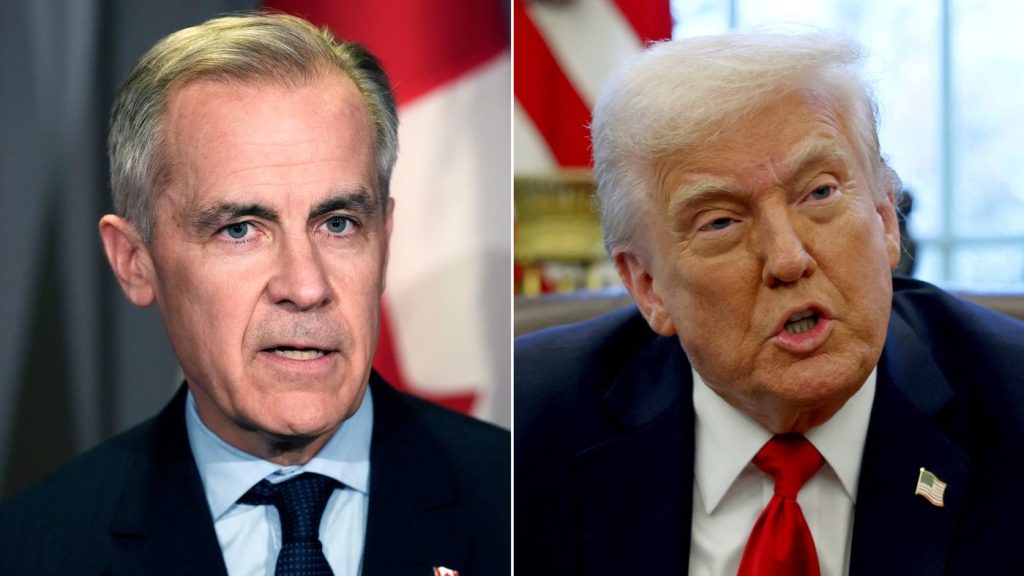MONTREAL As uncertainty looms ahead of a crucial U.S. tariff deadline set for next week, many businesses are currently paralyzed, halting capital investment, hiring, and financial forecasts. The trade war between the U.S. and its trading partners, particularly Canada and Mexico, has left companies in a state of confusion regarding future trade policies and relationships among allied countries.
U.S. President Donald Trump has announced sweeping tariffs on various imports, notably including goods from Canada, which are scheduled to take effect this Wednesday. However, details surrounding these tariffs change almost daily, primarily due to the fluctuating nature of the White House's plans over the past two months. Following a phone call between Trump and Prime Minister Mark Carney, referred to as “constructive” by the Liberal leader, businesses continue to grapple with ambiguity regarding tariffs.
Goldy Hyder, CEO of the Business Council of Canada, expressed the confusion, stating, “Nobody knows what the heck is going on.” He noted that the current environment feels reactive and uncertain. The U.S. has already instituted a 25 percent tariff on steel and aluminum imported from Canada and Mexico, as well as non-compliant goods under the North American Free Trade Agreement (NAFTA). The impending expiration of the tariff pause on compliant items, due to end on April 2, raises questions about the potential severity of future duties.
A senior official from the Ontario government indicated that Canada might soon be grouped with other “friendly” countries that could receive more lenient tariff treatment. U.S. trade representatives have categorized goods into two additional groups—one for “medium” tariffs and another designated as “China”—yet the specifics of these categories remain unclear. This lack of clarity contributes to an atmosphere of uncertainty that is adversely affecting investment and decision-making at Canadian companies.
Matthew Holmes, head of public policy at the Canadian Chamber of Commerce, observed that businesses are no longer pursuing new expansions or launching new products due to the unpredictability of tariffs. He emphasized the negative impact of repeated extensions and changes in tariff announcements, which serve to unsettle businesses.
One recent announcement from Trump included a surprising 25 percent tariff on imported vehicles, scheduled to take effect on April 3, with additional levies on auto parts anticipated by May 3 or later. Ontario Premier Doug Ford commented that U.S. Secretary of Commerce Howard Lutnick assured that Canada would face a different tariff rate, though the timeline remains uncertain. He noted that vehicles containing 50 percent U.S.-made parts would be exempt from these tariffs.
This prevailing uncertainty has resulted in a kind of paralysis among businesses. Dennis Darby, CEO of the Canadian Manufacturers and Exporters, pointed out that hiring has stalled, with some companies even reducing shifts. In contrast to just a few months ago when there were labor shortages, the current climate has dramatically shifted.
Since early March, Canada has imposed 25 percent tariffs on approximately $60 billion worth of American goods, with the threat of additional tariffs on $95 billion more if the U.S. does not relent. As a result, shippers are rushing to navigate changing tariff deadlines, resulting in a significant surge in cross-border cargo traffic. Recent transport data from Loadlink Technologies shows an impressive 25 percent rise in freight volumes year-over-year in January and an even steeper 58 percent in February.
Holmes recalled similar patterns witnessed during Trump's first presidency, where businesses accelerated actions before tariffs were enforced but faced steep declines post-implementation. Economists and the Bank of Canada have raised concerns about a potential recession if sweeping tariffs come into play this year.
Despite the uncertainty, the promise of forthcoming negotiations for a "new economic and security relationship" between Canada and the U.S., as announced by Prime Minister Mark Carney after his discussion with Trump, injects a glimmer of hope for more stable trade relations. These talks are slated to begin after the Canadian federal election and may act as a bulwark against further tariff threats.
Regardless of the outcome of the ongoing negotiations, the damage inflicted by the mere threats of tariffs has already been substantial. Holmes highlighted that the looming economic uncertainty impacts investment decisions, inflates prices, and prompts job losses along with contract cancellations. For companies like TFI International and BRP Inc., the financial outlook for the year remains elusive due to the “very foggy” situation prompted by these tariff fluctuations. This distrust towards the reliability of Trump’s statements only adds to the economic turmoil, as experts suggest that businesses must brace for turbulent times ahead.










